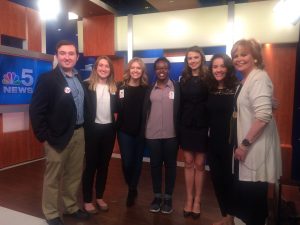The role of objectivity in the wake of tragedy
Brendan Pedersen
Right before I went to bed early Monday morning, my brain dimly registered a news alert from the Associated Press: in Nevada, a Clark County hospital was reporting “multiple injuries” from a country music festival. When my eyes opened a few hours later, I saw numbers: 50+ dead, 400+ wounded, and the second-time news organizations were able to use the phrase “worst mass shooting on American soil” in just over a year. Frankly, between the roles of journalist and citizen, I do not know how to handle the massacre in Las Vegas.
Keeping opinion out of my journalistic writing has always required a lot of effort, but it felt like a duty I was bound to uphold for the sake of my news reporting and most of my magazine writing – even though the latter allows for some flexibility here and there. I’m a political science student, and that tends to invite the urge to argue, to craft narrative around evidence that turns into a claim or point. But mainstream journalism has long been expected to retain a shred of impartiality so that it can view the world it studies objectively. Subscribing to a single argument or belief system can belittle an organization to claims of bias in the eyes of the public, damaging its ability to reach citizens on both sides of the aisle and establish a basis for civil discourse.
However, since the 2016 election and in the midst of the Trump presidency, plenty of political norms have been beaten to a pulp. Perhaps the most jarring has been the newfound scrutiny on the idea of “objectivity” in journalism – specifically on its relevance. For example, when Trump officially renounced his former conviction that Barack Obama was not a U.S. citizen, the New York Times ran a front page “analysis” breaking down the then-candidate’s long history of hypocrisy and contradiction. We in the journalism world know that analysis is often code for opinion, and the Times’s choice to give theirs such a priority didn’t go unnoticed by media commentators.
But for many, Trump represented a uniquely existential threat to democracy, to the press, and to people of color, and that threat was worth calling out. Trump – the man and administration – has somehow become transcendent of normal politics. How far does that change reach? Has the way we talk about politics changed forever? The discussion around gun violence has been the definition of American politics as usual for decades now, and the media has often done its due diligence to get both sides of that debate recognized. Does a new, blood-stained high score challenge that norm? Should it?
In 2016, following the massacre in Orlando, the Boston Globe decided that it had reached the threshold of its moral outrage. It combined its newsroom with its opinion office and, despite misgivings from both teams, together they churned out an entire print issue dedicated to gun violence analysis and statistics a few days after the tragedy. It sent 8,000 tweets and 10,000 emails out to its readers, asking them to petition their representatives for meaningful change, amounting to what feels like a cardinal sin in the religion of journalistic objectivity.
As a journalist, I’ve written as objectively as I can about gun violence on the local and national level in the past. As a human being, the senselessness and brutality of it shakes me to my core every time. It is my conviction that gun violence is a public health concern of the highest order, but I don’t know if I can argue on behalf of solutions – even admit those beliefs — to my readers and hope to retain their trust. At the same time, as someone who believes that journalism is a career rooted first and foremost in public service, I also don’t know if I can look at myself in the mirror while relying on what has become a false equivalency – liberty for lives – pretending that I believe the gun violence is an inevitability in this country, or that the forces that have entrenched it are immovable. They are not. ####
